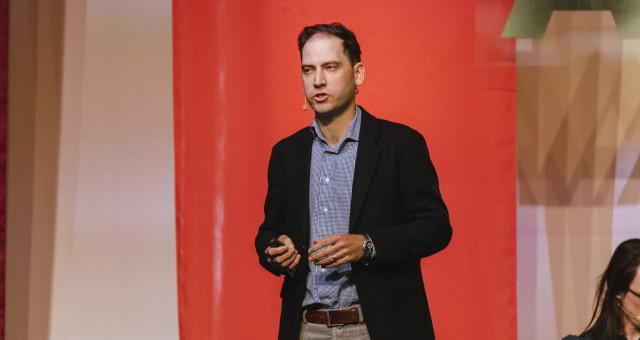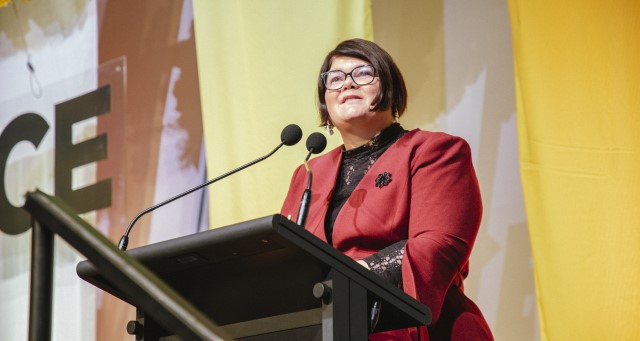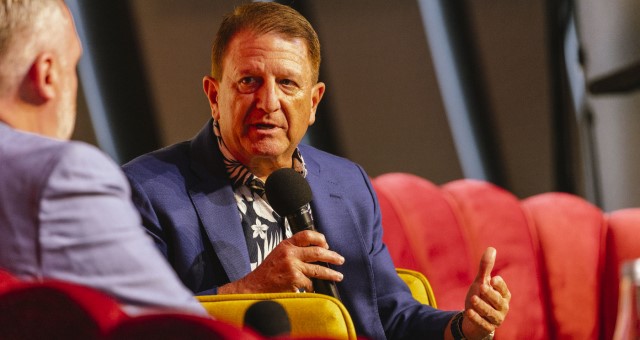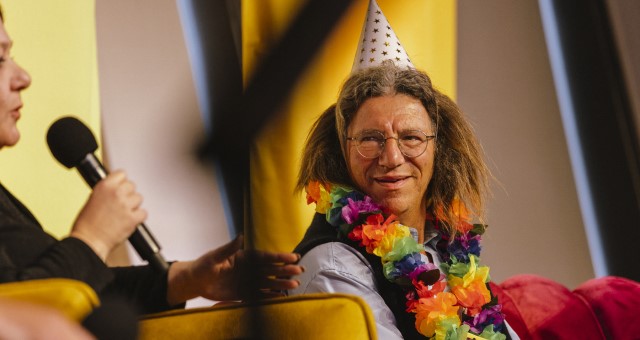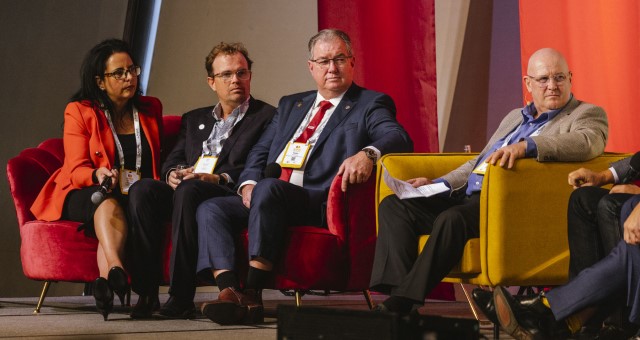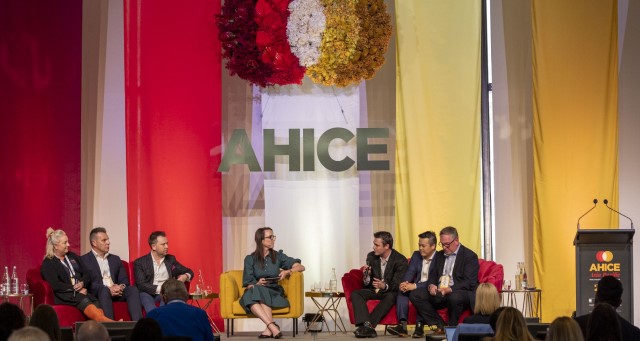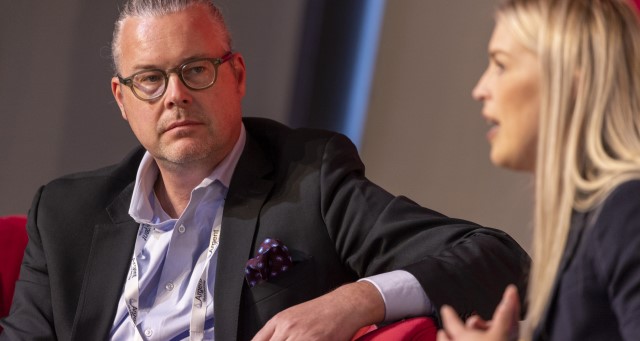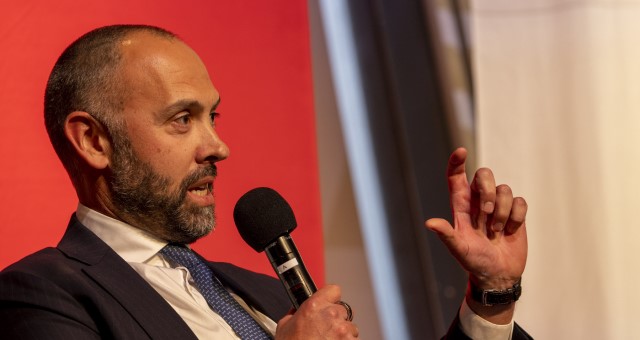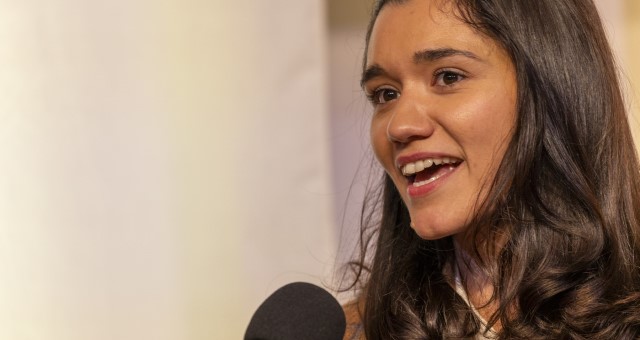It was standing room only from the word go at the Adelaide Oval for the 2023 Asia-Pacific Hotel Industry Conference and Exhibition (AHICE) which kicked off on Wednesday May 3.
Armed with Lavazza coffee, fruit and pastries, the breakfast masterclass kicked off with Adam Bury from JLL pondering how hotel financing would react to the recent series of RBA interest rates rises.
With some revealing statistics, it was determined that RevPAR was strong and demand high.
“There is definitely money out there for the right projects,” said Regis Capital’s Mark John. This is despite the panel noting that quantitative tightening (QT) had never been seen to this degree.
Salter Brothers’ Joel Zanoni reminded the packed room that “borrowers sitting outside the bank criteria can still find funding”. ANZ’s Tim Addison countered by observing that “non-banks are seen as semi-complementary to the market.”
Mark John warned that banks don’t want to know about your problems. “Don’t go to the bank and say, ‘we’re in trouble’. You need to fix that.”
Following the emotive Welcome to Country ceremony, emcee Jess Adamson introduced South Australian Minister for Tourism and Multicultural Affairs, Zoe Bettison, enthusiastically talked up the impressive growth of her state. “South Australia is the place to be,” she said.
On the back of over 90% hotel occupancy and $8.3 billion flowing into the state through a resurgence of interstate and international visitors, “We’ve seen the highest ever 12-month tourism spend,” she said, “This reinforces that SA really knows how to put on an event.”
It was also confirmed that AHICE 2024 will also be held in Adelaide.
Never shy to ask the tough question, Ruth Hogan fronted a panel to address Essential Industry Outlooks.
While Matthew Burke of STR acknowledged that the surge, “could well be the unwinding of pent-up demand” he was still bullish about the outlook. “Now has never been a better time to open a hotel,” he concluded.
Michael Johnson of Accommodation Australia reiterated the issues of skills and staff shortages brought on by the pandemic and James Doolan of Hotel Council Aotearoa lamented New Zealand’s lag in responsive policy making.
In conversation with James Wilkinson, IHG’s Kenneth Macpherson was keen to stress the importance of sporting event driving travel, noting “assets must complement the events.”

The slow return of the Chinese market and the prohibitive cost of airfares was mentioned while greater optimism was held for Thailand which had demonstrated a greater rebound performance.
OTA and data giant Expedia shared some insights, namely that non-refundable payments were a barrier to booking and that loyalty programs continued to play an important part in the booking process.
“Nearly half of all Expedia members belong to one loyalty program or another,” said area manager Shannon Saines, “and some as many as nine programs. Plus our members will read at least five reviews before booking.”
Dora Stilianos of Baker McKenzie moderated the next Operators Outlook panel where – again – the staff and training challenges were raised from the outset by IHG’s Matt Tripolone.
Trent Fraser of Choice noted the strong ADR increase of “as much as 30%” but posed the question “How long can we maintain this growth?”
He continued to enrich the discussion by suggesting hotels “needed to step outside the traditional organic growth models” and that ‘white label’ could hold clues going forward.
Howard Kemball of KCom moderated what was playfully dubbed the “Billionaires Panel” with party hats and colourful leis denoting a sense of cheerful optimism.
Leading the festive theme, was Dr Jerry Schwarz reflecting his motto of flexibility and personalisation.
Lucia Grambalova of Hotel Capital Partners reiterated the need for a strong strategic vision and leadership in an innovative partner.
The panel was split on CBD versus regional opportunities while it was agreed that hospitality was showing greater promise and stability than commercial and office space which was suffering as much as 15% downturn post-pandemic.
“Beds and sheds,” quipped Grambalova, “and beds are the way to go!”
In the next Q&A with James Wilkinson, Jeff Wagoner from Outrigger Hospitality Group was still keen to get back into the Australian market after their 2016 acquisition of the famous Hawaiian beach brand. Outrigger and KSL are also surprisingly modest about their entertainment coup with Cirque du Soleil beginning a residency at the Beachcomber Resort at Waikiki next year.
The ebullient Rodger Powell from THSA waded straight into the topic of regional tourism.
While we heard from the Moreton Bay Council and how they intended to expedite the investment approval process, Crystalbrook’s Geoff York still felt things could be better.
“It’s too slow,” he said bluntly, “We need to speed things up and remove the red tape.”
Despite the reservations of some like Geoff York, Julian Clark of the Lancemore Group declared it “bollocks” that it was not possible to make money in the regions.
“It’s important to differentiate the regions,” he said, “Not all the regions are the same.”
It was not overlooked that in view of the general rising costs of construction, it was more pronounced in the regions, prompting Wesley Milsom of Salter Brothers to remind us of the practicality of modular construction.
James Wilkinson’s Q&A with Minor Hotels CEO, Dillip Rajakarier, revealed the often ignored growth of Minor Hotels which was quickly outgrowing its modest moniker.
“We don’t aim to be the biggest hotel group,“ Dillip Rajakarier confided, “but the most profitable. Some of the big brands don’t care about owner returns, just planting flags.”
On the question of the Anantara brand coming to Australia, Rajakarier made his thoughts known. “Sydney would be ideal because it attracts the best rates. But we need to take our time and get the brand in the right place.”
After the Comcater-sponsored lunch, we were back with Ruth Hogan diving into hot hotel technology trends. Predictably, the oft-cited rise of AI and ChatGPT was the first topic.
Paul McLoughlin of Frontline Performance Group echoed much the same sentiment as the panel. “AI will create a higher expectation with guests and allow frontline staff to focus on the human element of hospitality, “he said “It will coexist but must focus on the correct areas like e-learning and product knowledge.”
Similarly, it will further eliminate the use of paper and open up resources to drive revenue.
Scott Wiedemann of Foxtel introduced ‘Matter’ the open-source connectivity standard, with a “watch this space” caveat, while Howard Phung of Pro Invest, bemoaned the high cost of entry for voice activation technology.
In terms of guest communication, Rachel Pelikan, warned of too much communication. “When does communication become frustration?,” she asked, referencing the deluge of emails and SMS messages some guests receive before arriving at their hotel.
James Wilkinson and Paul Watson discussed the success of HostPlus as the preeminent, “if not always sexy”, superannuation provider for the hospitality industry before handing over to Taylor O’Brien of JLL whose panel was primed to tackle the sometimes contentious subject of white labelling.
Always ready to contribute to any discussion, Andrew Bullock with his 1834 Hotels hat on, declared white labelling to be ‘brand agnostic’ and a matter of “the right fit for the right owner” with the sector “absolutely ripe for growth”.
Bullock had an ally in Graham Perry of BWH whose Aiden brand is gathering momentum and sees “great opportunity” in the white label arrangement.
Boutique and Lifestyle Hotels is a topic never far from any discussion of hotel trends and Hayley Manvell of CBRE was ready with a bevy of stylish practitioners.
QCC Collections’ Caspar Schmidt, who was prominent across all three days with his radical modular construction discussions, revived his “anything is possible” mantra declaring that his modules were “a quarter the price of regular hotel rooms” and were only impacted “by the variables of freight and site access.”
Aside from the practicalities of construction, Wayne Taranto of Ovolo believes boutique is all about “building an emotional connection and reputation without an overly transactional policy.”
Gado Hassin of Selina believes boutique “grows community and caters to the trend among the new generation of remote and mobile working.”
Pat Lonergan of DOMA pointed to the “frictionless customer experience” as a key component of this sector.
Next, Wyndham’s Joon Aun Ooi chatted with James Wilkinson and introduced many among the audience to developing brands: Echo Suites for the extended stay market and Alltra Resorts for the all-inclusive sector.
“What is also refreshing is that 20 to 30% of all our new deals are with repeat owners,” he said, underscoring his confidence in Wyndham’s ability to satisfy their clients in every respect.
Pro-Invest’s Tim Sherlock’s panel of real estate experts shone a light on the always-shifting property sector.
Mark Durran from Savills noted that “the return of Chinese capital will take time”, citing “outbound capital restrictions” despite “no lack of desire on their part”. Instead inbound capital is split predominantly amongst Singapore, Middle East and Vietnam.
Fiji, on the other hand, is offering generous tax incentives for investors according to Jenny Seeto of Investment Fiji.
“While debt cost may be increasing,” noted Michael Simpson of CBRE Hotels, “income is stronger (than 2019) and we can expect a huge increase in demand in line with population.”
For the regional market, Resort Brokers’ Trudy Crooks, declared “our buyers are delighted with their purchases, particularly Quest.” and “regional tourism is not going anywhere, so there is still a lot of opportunity.”
Peter Harper of JLL stated, “every city market is facing supply challenges as owners face better competition rather than more, indicating a flight to quality.”
This, according to Karen Wales of Colliers, was tending to see lesser quality hotels revert to residential.
South Australian Senator Don Farrell, Federal Minister for Trade and Tourism and Special Minister of State, highlighted the importance of employment in the tourism sector citing the fact that “23% of all new jobs in the Australian economy were in tourism, up 14% from 2019.”
“The government will work to increase the occupancy rate, “he promised, noting “20,000 extra rooms are coming to SA.”
He also pointed to the introduction of fee-free TAFE courses for the hospitality sector and the allocation of AU$8 million over four years “to enhance small to medium tourism businesses” along with funding for national parks, particularly Kakadu.
In the next Q&A, Rajeev Menon of Marriott was proud to announce that his company would be opening two hotels a week in 2023 as part of “a decades-long growth story.”
Also of particular note is that the seven joint-venture Bulgari Hotels return the highest RevPAR in every city they are situated in.
Paul Salter followed in the next Q&A where he elaborated on the AU$130 million Spicers acquisition from Flight Centre founder, Graham ‘Skroo’ Turner late last year.
“People are prepared to pay for exerience,” said Salter, “but they still demand value. The all- inclusive model works great in Australia, but will it work in Asia?” Does that mean “watch this space?”
Industry heavy-hitter, John O’Sullivan broached the topic of ‘The Travel Boom’, noting that aviation had achieved 86% of pre-pandemic capacity.
In response, Kathy O’Brien of Air New Zealand, reminded us that it was easy to take planes out of service and much harder to bring them back. “Like so many airlines, our capacity is constrained through lack of staff. Remember, a B777 aircraft takes around 1500 hours to restore to service.”
Luxury Escape Founder, Adam Schwab whose business still is impacted by flight costs was less sympathetic accusing airlines “of running roughshod over the travel industry.”
O’Brien attempted to placate the panel with “toward the end of 2023, we should see some plateauing of prices.”
None of this seemed to be worrying Brent Hill, CEO of Fiji Tourism, who reported near 90% occupancy and the need for another 2000 rooms. His airline, by the way, is adding new planes.
In Barry Robinson’s Q&A, he revived the tried-and-tested timeshare concept citing Wyndham’s aspirations for Asia, particularly Thailand and Japan.
The Ascott Limited’s David Mansfield told Ruth Hogan that he expected his suite of brands to be better known in the Australian market very soon with a corporate-focussed Oakwood property to soon be in every capital city, along with Citadines.
“A 255-key Citadines will open soon in North Sydney,” he said, “while Ascott needs to build more recognition. Lyf (the brand aimed at a younger demographic) is our third priority.”
Girish Jhunjhnuwala, the founder of Ovolo Hotels, eschewed the notion of loyalty programs. “We’re all about the enhanced customer experience. We own our assets and wish to grow cautiously.”
On the question of Hong Kong: “Hong Kong is always good at bouncing back.”
For the final panel, Amelia Perez from Hilton stepped up at short notice to helm the discussion about What Rising Stars Want and immediately posed the question: “Is the industry doing enough?”
Sam Swaffield from IHG confidently identified the big challenge at the start of one’s career, stating “people don’t quit because of the job, they quit because of the culture.” to which Tom Craigei was quick to add the value of mentorship. “Go get a mentor,” Tom implored, “there is so much knowledge out there.” Nick Macfie from JLL agreed and, looking across the room asked, “why not step up to be a mentor?”
Eden Camilleri from Accor spoke of leadership. “Great leaders build strength, but unfortunately not all experts make great leaders.”
Hannah Vale from M3 Property reminded the room that “we want to work for an organisation that supports sustainability and balance”, which was a fitting culmination to three days of intense introspection.
Read all about AHICE Day 2: equity, efficiency and environment

